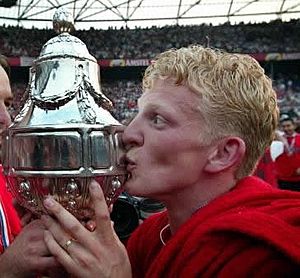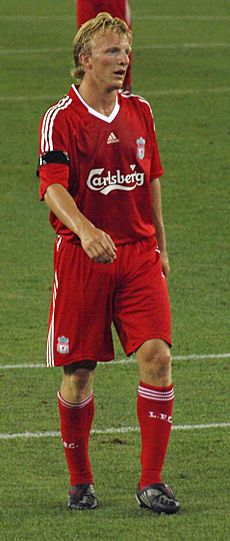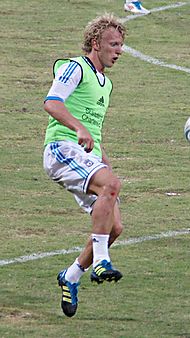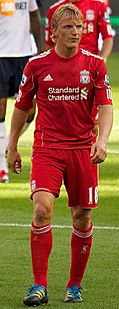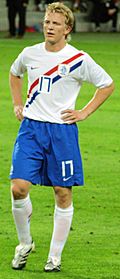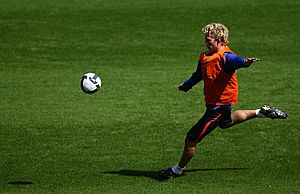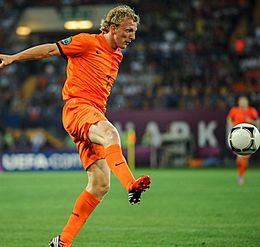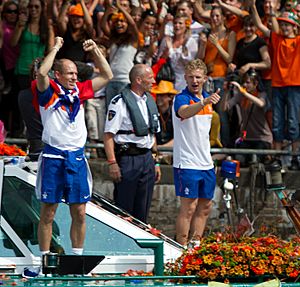Dirk Kuyt facts for kids
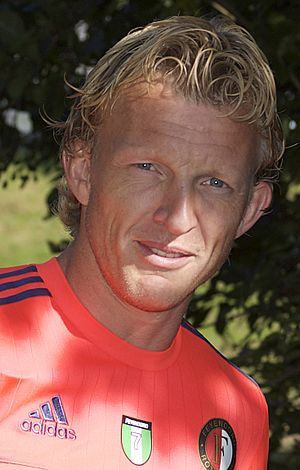
Kuyt with Feyenoord in 2015
|
|||||||||||||||||||
| Personal information | |||||||||||||||||||
|---|---|---|---|---|---|---|---|---|---|---|---|---|---|---|---|---|---|---|---|
| Full name | Dirk Kuijt | ||||||||||||||||||
| Date of birth | 22 July 1980 | ||||||||||||||||||
| Place of birth | Katwijk, Netherlands | ||||||||||||||||||
| Height | 1.84 m (6 ft 0 in) | ||||||||||||||||||
| Position(s) | Forward, right winger | ||||||||||||||||||
| Team information | |||||||||||||||||||
|
Current team
|
FC Dordrecht (manager) | ||||||||||||||||||
| Youth career | |||||||||||||||||||
| 1985–1998 | Quick Boys | ||||||||||||||||||
| Senior career* | |||||||||||||||||||
| Years | Team | Apps | (Gls) | ||||||||||||||||
| 1997–1998 | Quick Boys | 6 | (3) | ||||||||||||||||
| 1998–2003 | Utrecht | 160 | (51) | ||||||||||||||||
| 2003–2006 | Feyenoord | 101 | (71) | ||||||||||||||||
| 2006–2012 | Liverpool | 208 | (51) | ||||||||||||||||
| 2012–2015 | Fenerbahçe | 95 | (26) | ||||||||||||||||
| 2015–2017 | Feyenoord | 63 | (31) | ||||||||||||||||
| 2018 | Quick Boys | 3 | (0) | ||||||||||||||||
| Total | 636 | (233) | |||||||||||||||||
| International career | |||||||||||||||||||
| 1998–1999 | Netherlands U18 | 5 | (2) | ||||||||||||||||
| 2000–2001 | Netherlands U21 | 11 | (6) | ||||||||||||||||
| 2004–2014 | Netherlands | 104 | (24) | ||||||||||||||||
| Managerial career | |||||||||||||||||||
| 2018–2020 | Feyenoord (U19) | ||||||||||||||||||
| 2022 | ADO Den Haag | ||||||||||||||||||
| 2023–2025 | Beerschot | ||||||||||||||||||
| 2025– | FC Dordrecht | ||||||||||||||||||
|
Medal record
|
|||||||||||||||||||
| *Club domestic league appearances and goals | |||||||||||||||||||
Dirk Kuyt (born 22 July 1980) is a Dutch former professional footballer. He is now a manager for the club FC Dordrecht. He started his career as a forward (a player who scores goals). Later, he often played as a right winger (a player who attacks from the side of the field).
Kuyt began his professional journey with Utrecht in 1998. He quickly became a key player. In his last season there, he won his first major trophy, the KNVB Cup. He was also named the best player in the Dutch league that year. After this, he moved to Feyenoord.
At Feyenoord, he became the team captain in 2005. He was known for scoring many goals. He was the top scorer for Feyenoord for three seasons in a row. He also led the entire Eredivisie (the top Dutch league) in goals in the 2004–05 season. He was even named the Dutch Footballer of the Year in 2006. Kuyt was very reliable, playing in 179 games in a row between 2001 and 2006.
After three successful years at Feyenoord, Kuyt joined the English club Liverpool in 2006. He scored in the UEFA Champions League final in 2007, though Liverpool lost that game. He scored many important goals for Liverpool, including a hat-trick against Manchester United in 2011. He helped Liverpool win the League Cup in 2012, which was his only trophy with the club.
Kuyt also played for the Netherlands from 2004 to 2014. He played in five big international tournaments, including three FIFA World Cups (2006, 2010, and 2014) and two UEFA European Championships (2008 and 2012). The Netherlands finished second in the 2010 World Cup and third in the 2014 World Cup with Kuyt on the team.
Kuyt announced he was retiring from playing football in 2017. He scored three goals in his very last game, helping Feyenoord win their first league title since 1999. He briefly returned to play for his first club, Quick Boys, in 2018 to help them out.
Contents
Early Life
Kuyt is the third of four children in his family. His father was a fisherman. Kuyt has said that if he hadn't become a footballer, he probably would have followed his father into fishing. He grew up in a fishing town called Katwijk aan Zee.
Kuyt started playing football at age five for his local amateur team, Quick Boys. He joined their main team in March 1998. His skills caught the attention of Eredivisie club Utrecht. Kuyt still visits his old club, Quick Boys, which received money when he moved to Liverpool.
Club Career
Utrecht Years
Kuyt signed his first professional contract with Utrecht when he was 18. He quickly became a regular player for the team. Sometimes he played as a striker, but he was often a winger.
In the 2002–03 season, the new manager, Foeke Booy, decided to play Kuyt as a main striker. Kuyt scored 20 league goals that season. Utrecht also reached the KNVB Cup final and surprisingly won 4–1 against Feyenoord. Kuyt scored a goal and was named the best player of the match. After this successful season, he moved to Feyenoord.
First Time at Feyenoord
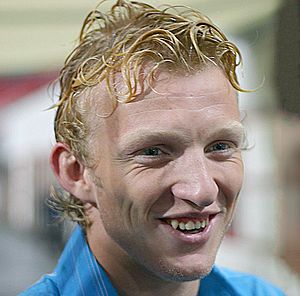
Kuyt quickly became a fan favorite at Feyenoord because he kept scoring goals. In his first season, he scored 20 league goals. In the 2004–05 season, he scored his first hat-trick (three goals in one game) against De Graafschap. He ended that season as the top scorer in the Eredivisie with 29 goals, which was his highest ever.
In 2005, Kuyt became the captain of Feyenoord. He had another great season, scoring 25 goals. He formed a strong partnership with teammate Salomon Kalou, and they were nicknamed "K2."
Many English clubs, like Liverpool and Newcastle United, were interested in Kuyt in 2006. He said he was happy at Feyenoord but wanted to play in the Premier League. He joined Liverpool on 18 August. Kuyt was very durable, missing only five games in seven seasons from 1999 to 2006.
Liverpool Years
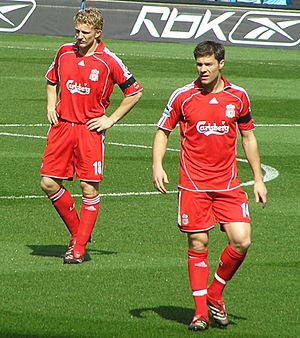
When Kuyt joined Liverpool, he said he only wanted to leave Feyenoord for a "really big club," and he felt Liverpool was that club. He made his first appearance for Liverpool as a substitute on 26 August 2006. He scored his first Liverpool goal against Newcastle United. He quickly became popular with fans because of his hard work and polite actions after games, where he would applaud the supporters.
Kuyt played a big part in Liverpool reaching the Champions League final in 2007. He scored the winning penalty kick in the semi-final shootout against Chelsea. He also scored a goal in the final against Milan, but Liverpool lost 2–1.
In the 2007–08 season, Kuyt scored two penalty kicks against Everton in a local derby game, helping Liverpool win 2–1. He also scored important goals in the UEFA Champions League against Internazionale, Arsenal, and Chelsea. He started playing more as a right winger and helped set up goals for other players like Fernando Torres.
In the 2008–09 season, Kuyt scored a late goal against Standard Liège to help Liverpool qualify for the Champions League group stages. He also scored late winners against Manchester City and Wigan Athletic. This earned him a reputation as a "Big Game Player" because he often scored in important matches. He scored 15 goals that season, his best for Liverpool, as they finished second in the Premier League.
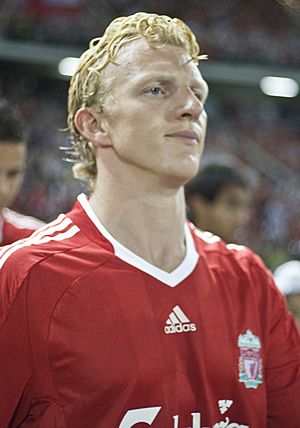
In the 2009–10 season, Kuyt often played as a central striker due to injuries to other players. He scored important goals in the Champions League and in the Merseyside derby against Everton. He scored his 50th goal for Liverpool in a 1–0 win against Everton in February 2010. He played his 200th game for Liverpool on the last day of that season.
In the 2010–11 season, Kuyt scored his first Premier League hat-trick for Liverpool against rivals Manchester United in March 2011. He signed a new contract to stay at the club until 2013. He became the first Liverpool player in over 20 years to score in five games in a row. He finished the season as Liverpool's top scorer with 13 league goals and 15 goals overall.
In the 2011–12 season, Kuyt scored his 50th league goal for Liverpool, becoming only the fifth player to do so in the Premier League for the club. He scored a crucial goal in the League Cup final against Cardiff City. Liverpool won the trophy after a penalty shootout, with Kuyt scoring his kick. This was his only trophy won with Liverpool.
Fenerbahçe Adventure
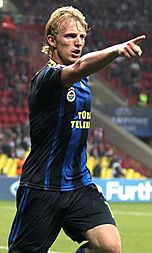
In June 2012, Kuyt signed a three-year contract with the Turkish club Fenerbahçe. He scored his first goals for Fenerbahçe in a Champions League qualifying match. He also scored in his first league game for the club. During his time there, he scored his 250th career goal, including his international goals. He helped Fenerbahçe win the Süper Lig (Turkish league) in 2014 and the Turkish Cup in 2013.
Return to Feyenoord
In April 2015, Kuyt signed a contract to return to his old club, Feyenoord. In the 2016–17 season, he led his team to their first Eredivisie title since 1999. On the very last day of the season, he scored a hat-trick to secure the championship. Three days later, on 17 May 2017, Kuyt announced he was retiring from playing football.
International Career
Dirk Kuyt played for the Dutch national team from 2004 to 2014. He became a regular player after Marco van Basten became the coach. Kuyt usually wore the number 7 jersey for his country.
World Cups and Euros
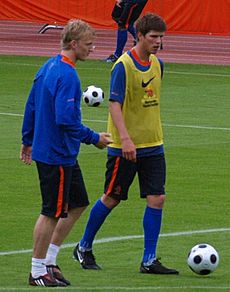
At the 2006 World Cup, Kuyt was mostly a substitute but did start one group game. In the knockout stage, he started ahead of Ruud van Nistelrooy but the Netherlands lost to Portugal.
Kuyt was part of the Dutch squad for UEFA Euro 2008. He played well in their opening 3–0 win over world champions Italy, helping with two goals. He then scored his team's first goal in a 4–1 victory over France. During Euro 2008, he often played as a winger.
Kuyt scored three goals during the qualifiers for the 2010 World Cup. At the tournament in South Africa, he scored the Netherlands' second goal in their 2–0 win against Denmark. He also helped set up goals in the quarter-final against Brazil and the semi-final against Uruguay. Kuyt started all seven matches as the Netherlands finished second, losing to Spain in the final. He ended the tournament with one goal and three assists.
For UEFA Euro 2012, Kuyt scored several goals in the qualifying matches. However, he lost his starting spot during the main tournament and only made two brief appearances as a substitute.
At the 2014 World Cup, Kuyt played his 100th game for the Netherlands in their win against Mexico. This made him only the seventh Dutch player to reach 100 international matches. The coach, Louis van Gaal, used Kuyt in many different positions during the tournament, including left wing-back and centre forward.
In the quarter-final, Kuyt scored a penalty in the shootout win against Costa Rica. In the semi-final, he also scored his penalty kick in the shootout against Argentina, but the Netherlands lost. In his last international game, the third-place play-off, the Netherlands beat Brazil 3–0.
Kuyt officially retired from international football on 3 October 2014. He explained that the coach no longer had a role for him that he preferred, and at 34, he felt it was time to be honest with himself. He looked back with great pride on his 10 years with the national team.
Managerial Career
On 2 June 2022, ADO Den Haag announced Kuyt as their new head coach. He signed a one-year contract. However, he was fired on 24 November 2022, after the team had disappointing results.
On 28 December 2023, Kuyt became the manager of Challenger Pro League (Belgian second division) club Beerschot. He signed a contract until the end of the 2023–24 season. Beerschot won the Challenger Pro League title and earned promotion to the top division of the Belgian Pro League on 7 April 2024. However, the club finished last in the following season and was relegated back to the second division. Kuyt left the club on 20 June 2025.
On 27 June 2025, Kuyt became the head coach of the Dutch side FC Dordrecht, signing a one-year contract.
Personal Life
Kuyt's former wife, Gertrude, was well-liked in the Dutch media for her down-to-earth nature. She continued to work as a nurse even after marrying Kuyt, until their daughter, Noelle, was born. Dirk and Gertrude did a lot of charity work together. They started the Dirk Kuyt Foundation to help disadvantaged children in the Netherlands and other parts of the world. They divorced in 2020.
Kuyt's father, also named Dirk, passed away from cancer on 29 June 2007.
Honours
Player
Utrecht
- KNVB Cup: 2002–03
Liverpool
- Football League Cup: 2011–12
Fenerbahçe
- Süper Lig: 2013–14
- Turkish Cup: 2012–13
- Turkish Super Cup: 2014
Feyenoord
- Eredivisie: 2016–17
- KNVB Cup: 2015–16
Netherlands
- FIFA World Cup runner-up: 2010
- FIFA World Cup third place: 2014
Individual Awards
- Dutch Golden Shoe: 2003, 2006
- Eredivisie Top Scorer: 2005
- Dutch Footballer of the Year: 2006
Manager
Beerschot
- Challenger Pro League: 2023–24
See also
 In Spanish: Dirk Kuyt para niños
In Spanish: Dirk Kuyt para niños
- List of footballers with 100 or more caps
 | Percy Lavon Julian |
 | Katherine Johnson |
 | George Washington Carver |
 | Annie Easley |


